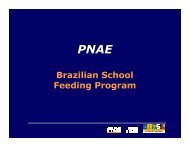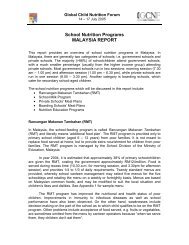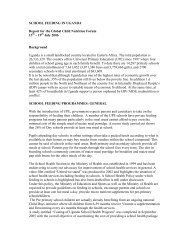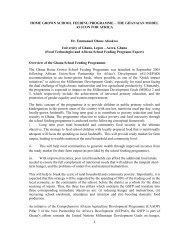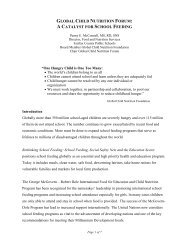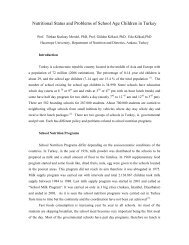EXECUTIVE SUMMARY - Global Child Nutrition Foundation
EXECUTIVE SUMMARY - Global Child Nutrition Foundation
EXECUTIVE SUMMARY - Global Child Nutrition Foundation
You also want an ePaper? Increase the reach of your titles
YUMPU automatically turns print PDFs into web optimized ePapers that Google loves.
Synergistic community partnerships strengthen school<br />
feeding programs.<br />
The most effective community partnerships focus on execution<br />
and have clear, concrete goals. SIGN has generated more than<br />
20 partnerships between its platform members and organizations<br />
in Ghana. The most important have been governmental partnerships<br />
that established the GSFP. Other significant partnerships<br />
include GSFP monitoring programs, school garden initiatives,<br />
microcredits for organic farmers, food fortification and social<br />
accountability programs.<br />
A common feature shared by successful partnerships is the<br />
synergy created among different stakeholders. SNV is hoping to<br />
forge partnerships between local farmers and school feeding<br />
programs in Ghana, Kenya and Mali. It has submitted a proposal<br />
to the Bill & Melinda Gates <strong>Foundation</strong> for a procurement<br />
governance project. Since no clear guidelines exist at the local<br />
level related to food procurement, SNV plans to pilot<br />
procurement mechanisms that will improve access to locally<br />
grown foods.<br />
“One big theory of change in the SNV program is<br />
to bring smallholder farmers to the forefront and<br />
empower them to deliver food for school feeding<br />
programs.”<br />
Adama Jehanfo, SNV<br />
The community participation process can be challenging,<br />
but the payoffs are great.<br />
Garnering community participation can be challenging. Gaining<br />
stakeholder buy-in is time consuming, but it is essential to<br />
guarantee accountability and open communication. Ms. Jehanfo<br />
and Mr. Schilpzand described lessons learned through the<br />
GSFP:<br />
Government acceptance is critical. School feeding programs<br />
cannot succeed without government buy-in and acceptance.<br />
The responsible government institutions must be involved in<br />
all processes. To legitimize mandates, it can be helpful to sign<br />
agreements with the government.<br />
Transparency builds trust. When multiple stakeholders and<br />
public support are involved with a school feeding program,<br />
transparency is essential.<br />
Scaling Up Sustainability: Linking School Feeding with Agriculture<br />
Development to Maximize Food Security<br />
May 3-7, 2011<br />
Nairobi, Kenya<br />
© 2011 GCNF and PCD. All rights reserved. Page 22<br />
Communication is necessary among partners and with the<br />
larger environment. Beneficiary demands and donor offers<br />
must be clear from the outset. Open dialogue is necessary.<br />
Cultural differences must be bridged. Cultural differences exist<br />
between countries, as well as between sectors. For example,<br />
some NGOs see their role as one of a critic. As a result, they<br />
may be unwilling to participate in community partnerships. The<br />
business sector, on the other hand, has a strong interest in the<br />
payback from their involvement.<br />
Some barriers cannot be overcome. Ms. Jehanfo noted that<br />
even when programs promote transparency, some institutional<br />
barriers and hierarchies can prevent accountability.<br />
Soft power can have great influence. SIGN has demonstrated<br />
the effect of soft power. It has effected change through networking,<br />
information, advocacy, and commitment. Mr.<br />
Schilpzand noted that having a large network that can adapt to<br />
new challenges is very important.<br />
“Committed people can create leverage: think<br />
big, start small, and grow big.”<br />
Rutger Schilpzand, SIGN<br />
Other Important Points<br />
Market queens. In Ghana, powerful women called “market<br />
queens” purchase food from farmers and resell it in markets.<br />
Some local farmers are not willing to give up their relationships<br />
with the market queens in order to partner with the GSFP. In<br />
these cases, GSFP partners with market queens to sell food to<br />
schools. Prices are negotiated at the local level.<br />
Community nutrition education. Schools provide a vehicle for<br />
disseminating nutrition education messages to the wider<br />
community. <strong>Child</strong>ren can act as agents of change, bringing<br />
lessons learned home to parents and siblings and promoting<br />
consumption of a well-balanced diet.



